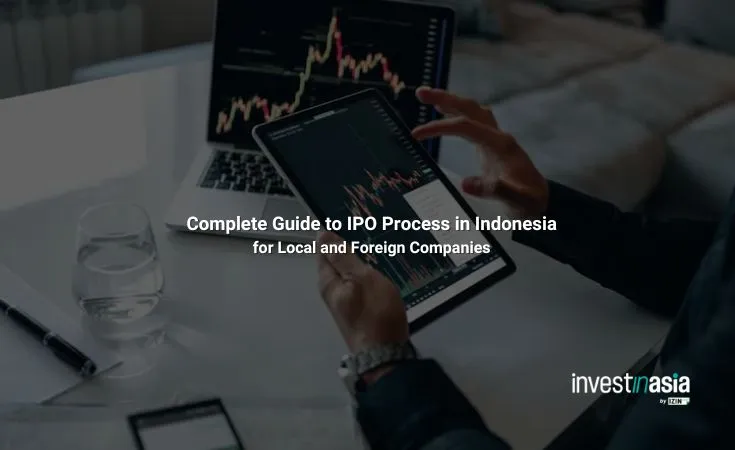Going public in Indonesia is a complex yet rewarding milestone that opens access to new capital, boosts valuation, and enhances business credibility. Whether you are a local company or a foreign investor planning to list on the Indonesia Stock Exchange (IDX), understanding the full IPO process—from eligibility to post-listing compliance—is essential for success.
At InvestinAsia, we help both local (PT PMDN) and foreign (PT PMA) companies build the legal foundation necessary for IPO preparation and regulatory compliance in Indonesia.
Legal Framework and Key Regulators
The Indonesian IPO process operates under Law No. 8 of 1995 on the Capital Market (amended by Law No. 4/2023) and is primarily supervised by:
- OJK (Otoritas Jasa Keuangan): Reviews and approves IPO registration statements.
- IDX (Indonesia Stock Exchange): Grants listing approval and regulates trading activity.
Together, these institutions ensure investor protection, transparency, and corporate accountability.
Eligibility: Local vs. Foreign Companies


Local Companies (PT PMDN)
Only limited liability companies (Perseroan Terbatas) established under Indonesian law can go public directly. They must meet IDX’s board-specific financial and governance criteria.
Foreign Companies (PT PMA)
Foreign investors must first establish a PT PMA (Foreign Investment Company) before proceeding to an IPO. Requirements include:
- Minimum capital of IDR 10 billion
- At least two shareholders and one resident director
Once established, a PT PMA can follow the same IPO procedures as local firms.
Also read: Can PT PMA Companies Conduct IPOs in Indonesia?
Insight from our consultants: If you’re a foreign business planning to go public in Indonesia but haven’t yet formed a legal entity, InvestinAsia can help you register a PT PMA or PT PMDN quickly and in compliance with all OJK and BKPM regulations.
Check the details here:
IDX Listing Boards
The Indonesia Stock Exchange (IDX) has three main listing boards:
- Main Board: For large, established companies with over three years of operations and audited financial statements.
- Development Board: For medium-sized companies with shorter business histories.
- Acceleration Board: For SMEs and startups offering flexible requirements and lighter financial thresholds.
This structure allows companies of different sizes to access capital markets suited to their growth stage.
Corporate Governance and Readiness
Strong corporate governance is fundamental for IPO success. Companies must establish:
- A Board of Commissioners with at least 30% independent members.
- A Board of Directors (including one resident director).
- Supporting bodies such as an Audit Committee, Internal Audit Unit, and Company Secretary.
Before listing, companies should conduct a comprehensive readiness assessment to evaluate financial systems, internal controls, and compliance.
IPO Preparation Stage
The preparation phase, typically lasting 12 to 18 months, involves:
- Forming an internal IPO task force.
- Engaging professionals including underwriters, legal consultants, auditors, appraisers, and notaries.
- Holding a General Meeting of Shareholders (GMS) to approve the IPO plan.
- Amending the Articles of Association to align with public company rules.
- Preparing and auditing financial statements.
- Ensuring full compliance with OJK and IDX requirements.
This stage builds the foundation for regulatory review and investor confidence.
Application and Approval
Companies must submit two critical filings:
- Listing Application to IDX
- Registration Statement to OJK
The process includes OJK’s multi-round document review, issuance of a publication permit, and approval of the Effective Statement, which marks readiness for public offering.
Public Offering and Listing
Once approved:
- Shares are offered to investors through the e-IPO system for transparency and equal access.
- After the offering, the company receives final listing approval from IDX.
- Trading officially begins, marking the company’s transition into a public entity.
This phase completes the transformation from a private company to a publicly listed one.
Also read: Public Limited Company in Indonesia (PT Tbk): A Complete Guide for Investors
Post-IPO Compliance


After listing, companies must maintain:
- Periodic reports (annual and semi-annual financial reports).
- Material event disclosures within one business day.
- Free float requirements (minimum 7.5% of shares held by public investors).
- Strong corporate governance and transparent investor relations.
Consistent compliance helps maintain trust and long-term market performance.
Common Challenges
Key challenges faced by companies during the IPO process include:
- Underestimating preparation time.
- Gaps in governance and reporting systems.
- Poor market timing.
- Underbudgeting for professional and regulatory costs.
- Managing post-IPO performance expectations.
Addressing these challenges early can significantly improve IPO outcomes.
Practical Tips for a Successful IPO
Here are some tips that can be done to facilitate your company’s IPO process:
- Start early; IPO readiness can take up to 18 months.
- Strengthen financial reporting and internal audit functions.
- Engage reputable underwriters and consultants.
- Maintain transparent communication with investors.
- Align corporate structure with IDX and OJK standards.
A disciplined, well-planned approach ensures a smoother IPO journey and stronger investor confidence.
The IPO process in Indonesia offers major opportunities for growth, visibility, and capital access. However, it requires preparation, regulatory compliance, and strategic execution.
At InvestinAsia, we guide both local and foreign companies in building the right legal foundation, whether through PT PMA or PT PMDN company registration, so you can confidently pursue listing on the Indonesia Stock Exchange.
Get started today:
Contact us now for a FREE consultation!
FAQs about IPO Process in Indonesia
Who regulates IPOs in Indonesia?
The OJK (Financial Services Authority) oversees IPO approvals, while the IDX (Indonesia Stock Exchange) manages listing and trading.
Can foreign companies go public in Indonesia?
Yes. Foreign investors must first establish a PT PMA under Indonesian law before proceeding to IPO.
How long does the IPO process take?
Typically 12 to 18 months for preparation and 3 to 4 months for execution, depending on company readiness.
What are the main benefits of going public in Indonesia?
Access to public funding, higher valuation, stronger brand visibility, and increased corporate credibility.
What makes a successful IPO in Indonesia?
Proper preparation, transparent governance, strong underwriter support, and consistent investor communication.



